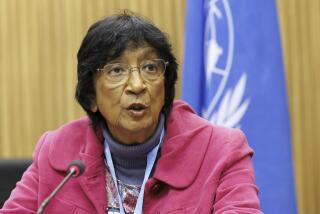China gets low grade in human rights
- Share via
BEIJING — The Chinese government has failed to meet its promise to introduce greater freedoms, Amnesty International charged Monday, in the latest international criticism ahead of the 2008 Olympic Games here.
The London-based human rights organization said in its report that China had made progress reforming its death penalty system and granting greater access for foreign journalists. However, the group charged that Beijing continues to detain local activists without trial, stifles domestic journalism, and has embarked on a campaign to “clean up” the streets of Beijing of petty criminals, vagrants and drug users ahead of the Summer Games.
“What we’re aiming to do is encourage China to showcase to the world that reforms have taken place, that they’re a respectable, modern member of the international community,” said Mark Allison, author of the report.
China’s Foreign Ministry rejected the report’s findings.
“The Chinese Constitution respects and secures human rights,” the ministry said in a statement. “We are seriously fulfilling our commitment to the Olympics and making our preparations. The development of human rights in China cannot be slandered by a few reports from an individual organization with political prejudice.”
Liu Wenzong, a director with the government-funded China Society for Human Rights Studies, also defended Beijing’s record, saying foreign activists fail to recognize signs of progress.
“The present situation has been much improved compared to 20 years ago and the Cultural Revolution,” Liu said. “Today, people have the right to express many personal opinions on the Internet.”
China has long been criticized for the abuses cited in the Amnesty International report. But in winning the bid for the 2008 Games, Beijing promised the International Olympic Committee that China would improve its human rights record.
Petr Kutilek, executive secretary of Prague, Czech Republic-based Olympic Watch, said the IOC was complicit with Beijing by deeming it “unrealistic” to spur China to make significant changes in its human rights policies.
“The IOC has so far been pretending that it has no responsibility and trying to represent human rights as a political issue, which it isn’t,” Kutilek said. “We’ve become skeptical of the IOC acting on these issues, so we’re going to the national [Olympic] committees to hopefully achieve some change.”
The IOC said Monday that it needed to review the findings in Amnesty International’s report before responding.
The central government in Beijing recognizes the benefit of having the world’s attention next year, and there are signs that China is on a public relations offensive to burnish its image before an estimated 30,000 foreign journalists arrive for the Games.
Amnesty International cited as examples of progress the fact that two political dissidents were allowed to visit Hong Kong, and an AIDS activist who previously had been banned from leaving China was permitted to receive an award in the United States.
In addition, China made two significant changes to its laws on Jan. 1: The Supreme People’s Court took control of the nation’s death penalty system, and foreign journalists were permitted to conduct interviews across the country without seeking permission from local authorities.
However, Amnesty International said there were inconsistencies in the application of the reforms. The group counted 17 executions in China between Jan. 1 and March 19, based on Chinese news reports. But the Supreme People’s Court reported only four in the period.
Beijing’s promise to give foreign reporters more access also has fallen short, with reports that local officials are not adhering to the rule. Two BBC reporters were expelled from a city in Hunan province after they tried to investigate the death of a student at a protest, the report says.
Allison said he found the treatment of Chinese activists and journalists troubling considering China’s duty to uphold such Olympic covenants as the “preservation of human dignity.”
The report details the plight of Ye Guozhu, who is serving a four-year prison sentence for attempting to organize demonstrations against forced evictions in preparation for the Olympics. He was allegedly tortured using electrical shock.
Ye’s case is not the only example of China’s wish to control its image before the Games, Allison said. Authorities are said to be detaining petty criminals, vagrants and drug addicts and denying them access to lawyers or trial. Some end up in the government’s “Reeducation Through Labor” programs. Drug addicts are being placed in “Enforced Drug Rehabilitation” programs for up to a year, the report says.
While foreign reporters might enjoy greater access, Chinese journalists face new restrictions. They have been instructed to seek permission before covering significant events and prohibited from reporting on judicial corruption or rights campaigns.
“What Beijing is trying to do by relaxing the regulations for foreign media is create an impression of more media freedom,” said Kutilek of Olympic Watch. “Amnesty rightly reports there’s really tightening of media freedom for domestic journalists.”
More to Read
Go beyond the scoreboard
Get the latest on L.A.'s teams in the daily Sports Report newsletter.
You may occasionally receive promotional content from the Los Angeles Times.







